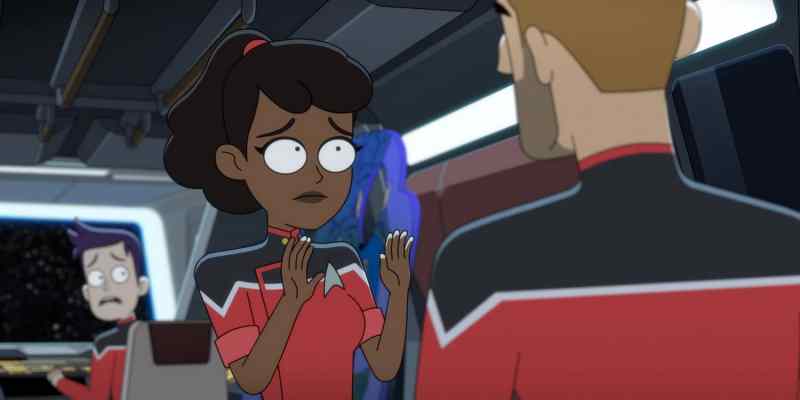This discussion and review contains spoilers for Star Trek: Lower Decks episode 5, “Reflections.”
Lower Decks has a surprisingly nuanced and well-developed core ensemble. Three seasons in, the audience has a pretty good sense of characters like Mariner (Tawny Newsome), Boimler (Jack Quaid), and Tendi (Noël Wells). However, Rutherford (Eugene Cordero) remains something of a mystery. This isn’t unusual. It is common for particular Star Trek shows to have “problem” characters, who don’t pop out in the same way that the rest of the cast might.
The Next Generation often struggled to build compelling drama around Deanna Troi (Marina Sirtis) and Beverly Crusher (Gates McFadden). Deep Space Nine took the better part of three seasons before it figured out how to write for Jadzia Dax (Terry Farrell) and Julian Bashir (Alexander Siddig). Voyager arguably never figured out how to make Chakotay (Robert Beltran) work and spent seven years recycling the same plots for Tuvok (Tim Russ) and Harry Kim (Garrett Wang).
It isn’t a huge issue that Rutherford is comparatively underdeveloped. Lower Decks is a sitcom, and part of the appeal of a comedy is that its characters are often broadly drawn archetypes. Indeed, it’s notable that characters like Mariner, Boimler, and Tendi have largely developed organically over extended periods of time rather than in concentrated spurts. This is most obvious with Tendi’s path towards senior staff, which seems to have been a happy accident rather than a planned arc.
This gets at the big problem with “Reflections.” It seems like a conscious effort to make up for lost time with Rutherford, in the most direct manner possible. After all, this is an episode that invites the audience to literally travel inside Rutherford’s head, meet his younger self, and imply a mysterious backstory that could presumably drive the character’s arc for a couple of seasons. It loads a lot on to the character Rutherford, in a manner that feels particularly heavy-handed.
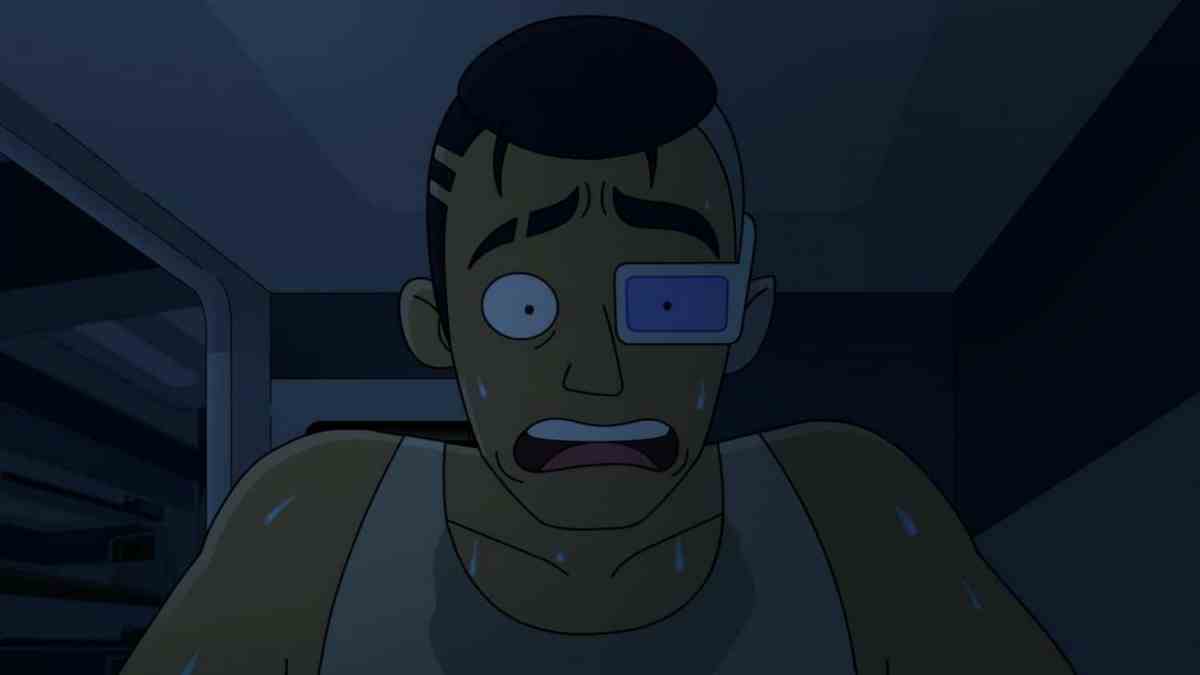
Lower Decks does quite a few things remarkably well. It is a show that can build entire episodes around loving homages to familiar Star Trek tropes. It is also a sturdy office comedy, skillfully applying the franchise’s allegorical storytelling to the modern workplace. The show can also be surprisingly experimental, occasionally even bending its format in interesting ways to tell stories that simply wouldn’t work on any other Star Trek series.
However, “Reflections” betrays a key weakness in Lower Decks, demonstrating that the series isn’t quite as good at other forms of storytelling. In particular, “Reflections” feels less like a parody or deconstruction of a particular archetypal Star Trek story and more like a conventional example of it. After all, the episode’s opening act is a fairly straightforward example of the classic “possession” or “body swap” plot, recalling “Turnabout Intruder,” “Vis à Vis,” or “Spock Amok.”
The problem is that none of these episodes are particularly good in their own right and that “Reflections” is playing these elements remarkably straight. There is a certain clumsiness to the episode, most notable in the revelation that the imposter posing as Rutherford is actually Rutherford’s younger self. It’s a good twist on paper — a clever take on the classic body swap concept. However, the actual reveal with Dr. T’Ana (Gillian Vigman) feels curiously inert in practice.
The core ideas that drive “Reflections” are interesting and could conceivably make for a decent episode. Who hasn’t wondered how their teenage self might react to the life that they live? Who hasn’t changed so dramatically since their teenage years that they are a fundamentally different person? There is good drama to be mined from that concept. However, while Lower Decks is consistently impressive with characterization, it is not suited to such a straightforward approach.
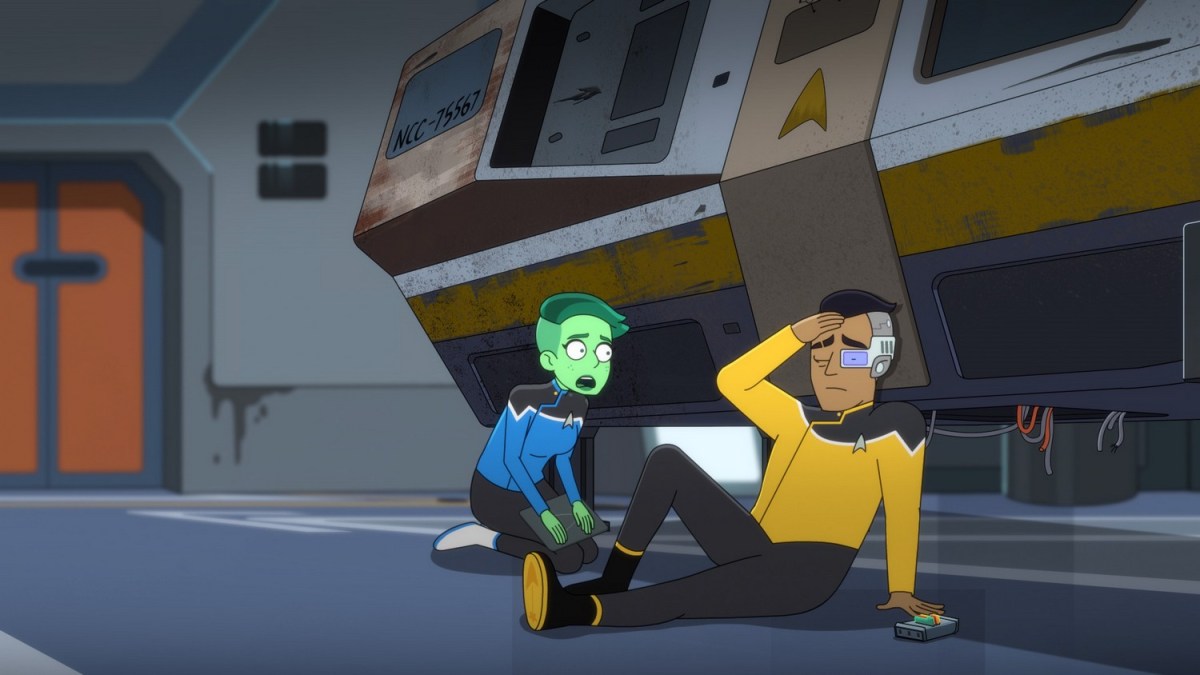
This is most obvious in the way that “Reflections” keeps getting distracted from its big emotional beats by empty nostalgia. Rutherford is racing for his very existence and consciousness, so that feels like a strange place to slot in some awkward Voyager nostalgia. Looking for a race craft, he manifests the Delta Flyer. “It’s superfast and it’s got pop-out impulse thrusters,” he boasts, excitedly. “Tom Paris designed it on Voyager.”
His younger self is not impressed. “You could have built literally anything you could imagine. You know that, right?” he muses. Of course, Rutherford’s choice to manifest the Delta Flyer is a winking acknowledgement that the episode’s “space race” set piece is a direct homage to “Drive.” However, “Reflections” doesn’t have anything to say about “Drive.” So the actual story here — Rutherford’s battle with his younger self — gets overwhelmed by fan-service references.
This happens again at the emotional climax of the story, as Rutherford cradles his younger self in his arms. It’s a moment that is surprisingly touching, accepting that in some cases change involves the death of a past self. “Sometimes it’s better to grow,” Rutherford’s younger self concedes. However, this poignant moment is immediately undercut with a blatant reminder of another more iconic death scene in The Wrath of Khan, as Rutherford’s younger self urges him to “remember.”
Lower Decks usually gets away with a bit more nostalgia than something like Strange New Worlds because those references rarely undermine comedic premises. In contrast, “Reflections” is a relatively earnest and dramatic episode of Lower Decks, but one that leans just as heavily and eagerly into fan service as something like “The Least Dangerous Game” or “Room for Growth.” The results are frustrating, and the episode never coheres as well as it might.
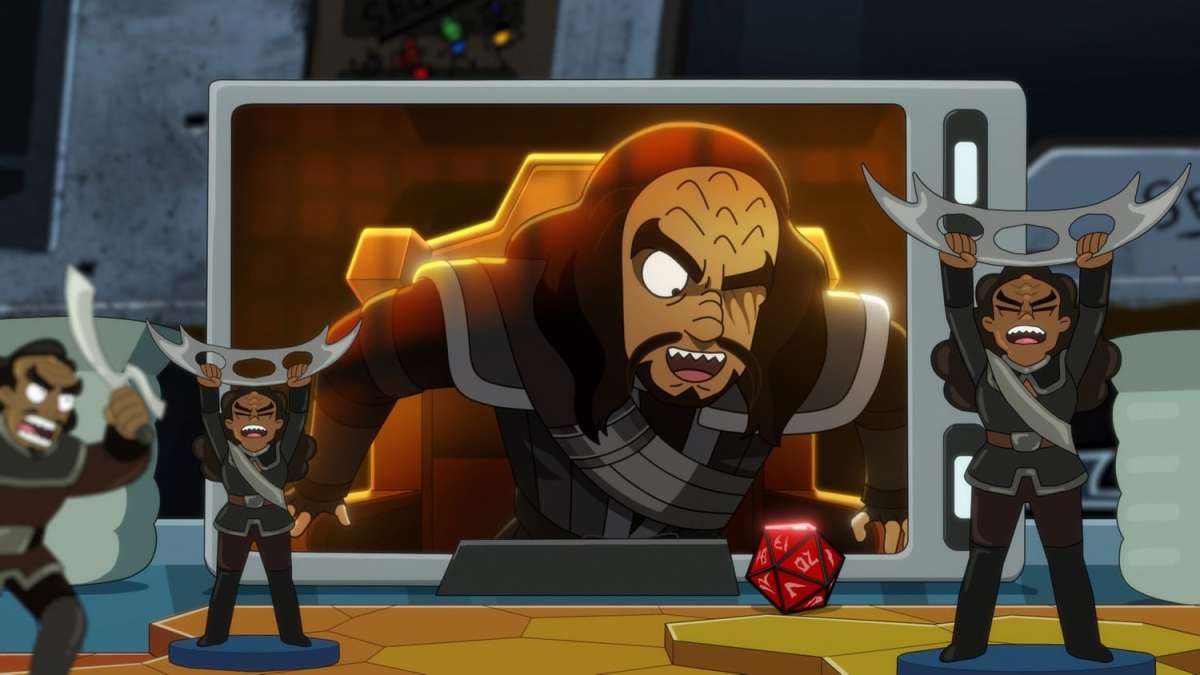
“Reflections” also suffers somewhat from the sense that it is doing a lot of legwork for threads that will presumably pay off later in the season. Lower Decks is a largely episodic series, but it has demonstrated the ability to slowly and steadily accrue continuity across its three seasons. However, “Reflections” is much clumsier and less organic in what it is doing. Interestingly, this clumsiness runs through both halves of the episode.
It is obviously present in the reveal that Rutherford’s implant was the result of “a cover-up,” a thread waiting to be pulled. However, it’s also evident in the character of Petra Aberdeen (Georgia King), who seems to be established primarily so she might come into play at a later point. It is intrusive in a way that the plotting in Lower Decks rarely is. Aberdeen’s introduction is much clumsier than that of recurring characters like Jennifer (Lauren Lapkus) or Kayshon (Carl Tart).
Lower Decks has been hinting for a while that Mariner may leave Starfleet. In “Room for Growth,” Mariner even suggested that this was how she saw herself drifting away from Boimler, Rutherford, and Tendi. The closing scene of “Reflections” offers Aberdeen as a potential escape hatch and partner, should a future episode (possibly the season finale) end with Mariner being drummed out or simply quitting Starfleet.
Of course, such a development seems likely to only be temporary — and not just because there will be a fourth season. “Reflections” is interesting in how it seems to acknowledge the awkward relationship between Starfleet and the larger Star Trek universe. Forced to work a recruitment stand, Mariner and Boimler brush up against the idea that those outside of Starfleet don’t think quite as much of the institution as those who serve in it.
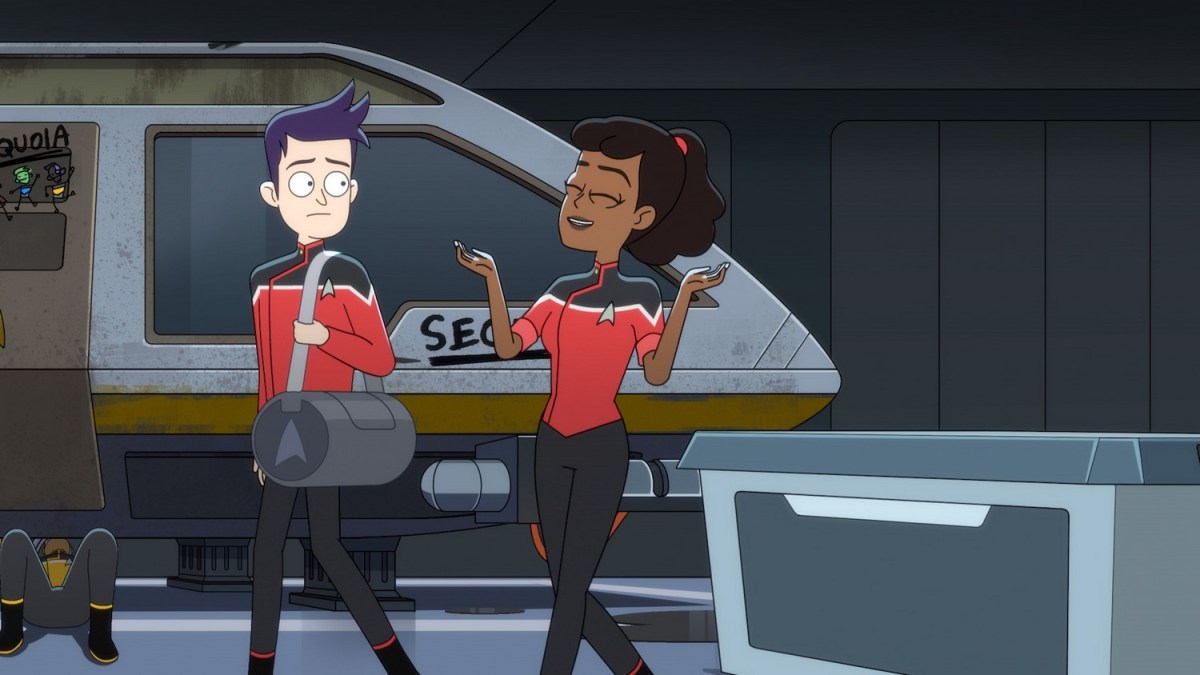
There is something potentially interesting here. After all, Deep Space Nine was notable as the first Star Trek show to really consider that there were perspectives outside of Starfleet. Aberdeen’s criticisms of the organization as “a pseudo-navy” are valid. Ironically, the conspiracy theorists are more or less right about, well… “Conspiracy.” Indeed, Aberdeen’s cynical asides about Starfleet provoke Boimler to go on a rampage on the campus.
“Without Starfleet, none of you would exist!” he raves. “We don’t want to protect you from the Klingons and Borg! We just want to explore and study fucking quasars! But you know what? It’s the right thing to do!” It’s a bizarrely entitled rant, a weird victimhood narrative from an officer in what appears to be the dominant military and political force in the quadrant after the Dominion War. It initially plays as a parody of these sorts of privileged meltdowns, with Boimler even spending a night in the brig as punishment.
However, Lower Decks pulls its punch. Building off his weird anti-scientists rant at the start of “Mining the Mind’s Mines,” Ransom (Jerry O’Connell) acknowledges that he is proud of Boimler for standing up to those civilians. Aberdeen herself confesses that her cynicism wasn’t rooted in any honest opinion, but instead a calculated ploy. “You were right,” she admits to Mariner. “I was only being a pain in the arse because I needed a distraction.” That’s the only reason to be critical of Starfleet.
Similarly, Rutherford’s flashbacks suggest that he was part of some secret and sinister Starfleet operation. Even then, Rutherford’s younger self is quick to avoid any criticism of Starfleet as an institution. “I guess someone broke even more rules than we did,” he quips. It’s just bad apples. After all, Starfleet was ultimately right that Rutherford shouldn’t have been building engines before he graduated. If he’d listened to them, he might have avoided his accident.
“Reflections” is an odd episode. It pushes Lower Decks outside its comfort zone. This can lead to successes like “Crisis Point” or “I, Excretus,” but “Reflections” moves the show into a dramatic space that can’t quite support the show’s nostalgia and heightened storytelling. There’s a compelling story somewhere in “Reflections,” but it’s not clear that Lower Decks knows how to tell it.
